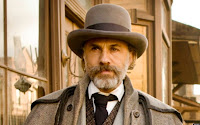Writer-director Quentin Tarantino has the knack to discover and, in some cases,
re-discover talent. He gave the then fading star John Travolta his
much needed comeback, and he paved the path to the stars for the
previously little known but highly talented Austrian-German actor Christoph Waltz. No wonder Waltz should refer to the film-maker in
his Golden Globe acceptance speech as Polaris, his guiding North
Star.
It
is the creative combination between Tarantino's writing and Waltz's
acting sensibilities that brought forth two performances that have
been (rightfully and deservedly) hailed with accolades and that are
memorable cinematic personalities: One as the German Nazi Officer
Hans Landa in Inglourious Basterds (a title that curiously never passes my spellchecker) and the more recent
endeavor as the German dentist King Schultz who finds himself caught
in a “Southern” Western in Django Unchained.
The
two characters have much in common, which is not surprising
considering that the same writer-director and actor have teamed up
for both projects. At the same time, the two movie characters
complement each other in interesting ways. They build and rebuild
peculiar views and stances regarding German thought and ideology.
In
the first character of Hans Landa, we meet an efficient and highly
intelligent officer who leaves nothing to chance. His diligence and
perfectionism makes this astute person as lethal as can be. It is
all served up with a dry humor and as usual with Tarantino we find -
against our own better judgement of course - that the "bad guy" is
likable despite his psychopathic essence. I had a similar reaction to
David Carradine's Bill in the Kill
Bill series who pulled
off both sides of his personality in an admirable manner: On one hand he
was the tender father, on the other hand a sadistic and merciless
assassin.
When
it comes to Hans Landa, we find a German who follows his own
principles and is, in fact, not tied to a specific ideology. He is no
Goebbels, for example, who would have his children die rather than
have them face a post-German world devoid of fascism. In other words,
Landa is not tied to anything than what he sees as rising out of the
necessity of the moment. In this sense, he is cunning and selfish,
choosing what personally suits him best.
In fact, he is both taking advantage of a corrupt system and
government while also falling victim to it. But due to his moral
flexibility, he changes horses in midstream. When he realizes that
his “horse” was perhaps doomed to lose, he switches sides. He
makes a deal with the Americans to escape the consequences of his
actions. Yet his collaboration with the forces of evil, whether fully
embraced or not, still leave him visibly scarred for life with its
bloody cross on his forehead.
Then
the second film adds to and rearranges the identity of the German.
This time around we are dealing with a bounty hunter (not a “Jew
Hunter”!) who lacks no scruples when it comes to killing bad guys.
He is, one might say with possibly a few qualms, a “good” guy who
does not shy away from killing outlaws who have done wrong, at least
in the past, and who are sought after by the law. It is like Brad Pitt's
Raine character who kills the Nazis collectively and indiscriminately
regardless of individual differences and personal variations since
they all represent the face of evil to him.
But
in the movie Django
Unchained, there is a
slight addendum. Although admittedly King Schultz does it all for his
own financial benefit, namely the compensation he receives for taking
his victims more dead than alive, there is little profit in his
decision to help Django. This comes out of his own desire to help,
hence revealing his heart, generosity, and a pronounced sense of
justice. This dentist is adamant in his principles and stands firmly
against any kind of injustice.
For
instance, he would like to save the slave who is mistreated and is
even ready to pay for him a significant amount of money. This image
that innocent people are being mistreated by cruel slaveholders
haunts him and leads to his not wanting to have any part in or
complicity with the immoral and inhumane trade of slavery. As a
result, he refuses stubbornly to shake the plant owner's hand.
This
almost pigheaded determination of not even symbolically giving in to
something that is seen as morally wrong puts the German on the other
side of what he was in Inglourious
Basterds. While as Hans Landa he went
along for the ride with the Nazis, here he stands firmly for freedom and
justice ready to sacrifice significant amounts of money and even his
own life for its endeavor.
Put differently, King Schultz represents justice
(and morality) in its most precise and literal form to protect
humanity from “bad guys,” whether they are (ex-)outlaws or
legally recognized slaveholders. And had he been able to ever meet
Hans Landa in person, there is another guy whose hand he would never ever shake!


2 comments:
Thanks for your comment and interest, IFQ!
And don't worry about chronology: In cyberspace time is a relatively subjective matter.
Very interesting! I love the character of King Schultz. I wish so much that he had existed! Christoph Waltz is such a kind and humorous man that King Schultz seems to be an extension of his own personality. His genius as an actor is that he can also portray the vicious (but humorous and fascinating) Landa. The scene where the pounces on and strangles the woman at the end of that movie is disturbing!
Post a Comment